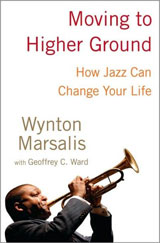
An ode to jazz
|
This review first appeared in the October 12, 2008 issue of the North County Times.
Wynton Marsalis is one of the most influential musicians in the United States today. Through his role as leader of the Jazz at Lincoln Center program, through his numerous recordings and constant touring and lectures, Marsalis is leading much of our ongoing discussion about the role of art in our culture.
A new book, co-written with Geoffrey C. Ward, is written in such a way that its main purpose seems to be as a jumping-off point for the next round of that discussion. Marsalis argues persuasively and passionately that jazz is unique among musical styles for its blend of improvisation and structure, with swing at the heart of it all.
Of course, as Marsalis' critics (who are numerous, and as passionate as he is) have long complained, his definition of jazz is a fairly old-fashioned one: Marsalis' take on jazz does seem to exclude fusion (he dismisses Miles Davis' entire 1970s and '80s catalog as "rock"), much less acid jazz (which is never even mentioned).
Marsalis is on strongest ground here when he's writing about the culture of jazz, explaining how the give-and-take of a live jazz performance is a good lesson on getting along with others in life in general. The passages where he explains the technical aspects of playing jazz in everyday language are also very informative to those who love the music but don't have the talent to play it.
When he goes off on that too-familiar refrain from jazz fans – that jazz is America's only serious music – well, that dig on other uniquely American music styles like bluegrass and country is as unnecessary as it is wrongheaded.
Still, he redeems himself with his chapter on the blues – the cousin of jazz, both born in the black communities of the Deep South just over a century ago – which is almost poetic as he lovingly describes it:
"With the blues, you have layers of meaning. The words say one thing, the way they're sung can say another, and the music always says something else. For all of the sorrow of some blues lyrics, the music is always grooving; a groove implies dance, and dance always brings joy. Dizzy Gillespie said it best: 'Dancing never made nobody cry.' That's the key to understanding blues. The blues delivers both joy and sorrow."
Marsalis' book delivers mostly joy, a reflection of his own lifelong love affair with the music.

